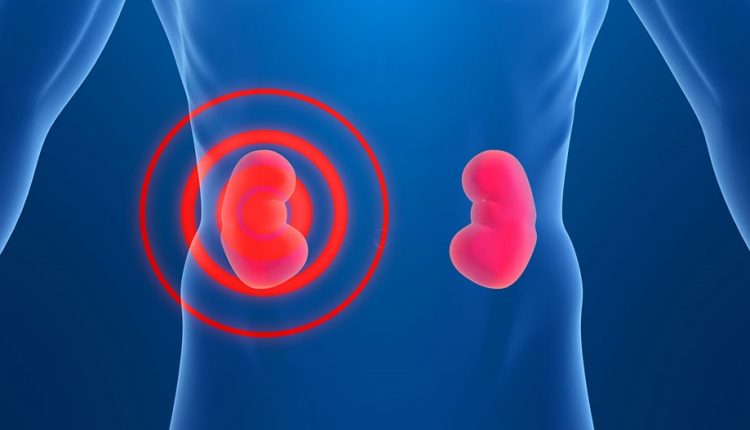
Kidney cancer: causes, symptoms and treatment
Cancer of the kidney (renal carcinoma) is a tumour that affects the mucous membrane cells of the renal tubules, the apparatuses that filter and purify the blood, stripping it of waste and eliminating it through the urine
Kidney cancer predominantly affects the male sex and has a higher frequency between the ages of 60 and 70, although there is a rare embryonic-derived form, nephroblastoma or Wilms’ tumour, which affects young children.
Causes of kidney cancer
The causes of kidney cancer are still poorly understood, but it is possible to identify cigarette smoking, obesity, high blood pressure, abuse of analgesic drugs and a diet high in protein and animal fats as risk factors.
A predisposition is also provided by family history and certain genetic disorders, such as Hippel-Lindau syndrome or hereditary papillary renal carcinoma.
Signs and symptoms of kidney cancer
The first symptom of kidney cancer is the presence of traces of blood in the urine (haematuria).
Other symptoms may be ureteral or bladder spasms caused by blood clots, the presence of a mass in the abdominal cavity, dull pain in the flank, hypertension, persistent fever, anaemia and weight loss.
Diagnosis of kidney cancer
The diagnosis of kidney cancer, which is often delayed due to poor initial symptoms, is made at the appearance of major symptoms such as haematuria or flank-back pain.
Among the instrumental examinations used are urography (an examination that is now rarely used), ultrasound, CT scan and nuclear magnetic resonance imaging (MRI).
Kidney cancer therapies
Cancer of the kidney is mainly dealt with by surgical treatment.
Surgical removal of the entire kidney (nephrectomy) is recommended in the majority of cases.
Chemotherapy and/or radiotherapy have not proven effective in combating the disease, playing a palliative role in cases of deep metastatic localisation.
Today, the therapy of choice is immunotherapy: the use of drugs that stimulate the immune system with a vaccine-like mechanism.
Recently introduced drugs called anti-tyrosine kinases have shown excellent efficacy and safety in use.
The prognosis depends on the size of the tumour, its spread, and the presence or absence of metastases.
Read Also:
Emergency Live Even More…Live: Download The New Free App Of Your Newspaper For IOS And Android
Kidney Stones: What They Are, How To Treat Them
Creatinine, Detection In Blood And Urine Indicates Kidney Function
How To Keep Your Kidneys Healthy?
Colour Changes In The Urine: When To Consult A Doctor
Paediatric Urinary Calculus: What It Is, How To Treat It
High Leukocytes In The Urine: When To Worry?
The Colour Of Pee: What Does Urine Tell Us About Our Health?
Kidney Function Replacement Treatment: Dialysis
Chronic Kidney Failure: Causes, Symptoms And Treatment
Pancreas: Prevention And Treatment Of Pancreatic Cancer
Gestational Diabetes, What It Is And How To Deal With It
Pancreatic Cancer, A New Pharmacological Approach To Reduce Its Progression
What Is Pancreatitis And What Are The Symptoms?
Kidney Stones: What They Are, How To Treat Them
Acute Pancreatitis: Causes, Symptoms, Diagnosis And Treatment
Kidney Cancer: Laparoscopic Surgery And The Latest Technologies
Gallstones: Causes And Symptoms
Hepatocarcinoma: Symptoms, Diagnosis And Treatment Of Liver Cancer
Cervical Dysplasia: What Are The Risk Factors And How To Treat It
Laryngeal Tumours: Symptoms, Diagnosis And Treatment
Malignant Tumours Of The Oral Cavity: An Overview
Neuroendocrine Tumours: An Overview
Benign Tumours Of The Liver: We Discover Angioma, Focal Nodular Hyperplasia, Adenoma And Cysts
Tumours Of The Colon And Rectum: We Discover Colorectal Cancer
Tumours Of The Adrenal Gland: When The Oncological Component Joins The Endocrine Component
Brain Tumours: Symptoms, Classification, Diagnosis And Treatment
What Is Percutaneous Thermoablation Of Tumours And How Does It Work?
Colorectal Resection: In Which Cases The Removal Of A Colon Tract Is Necessary
Thyroid Cancers: Types, Symptoms, Diagnosis



